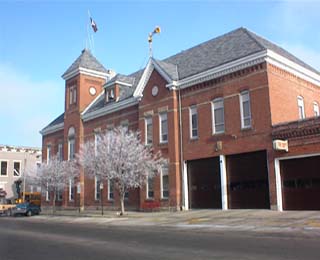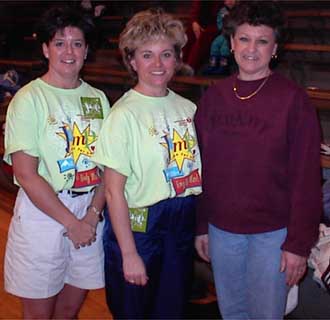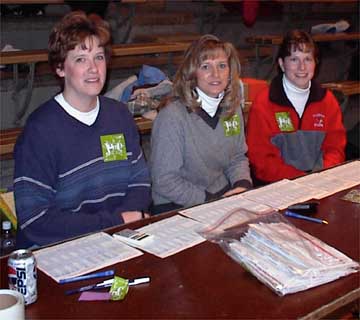| |
|
Lincoln
Loves Library,
9-1-1, Fire Service
Capstone
survey shows Lincoln residents like their town
[FEB.
8, 2000]
A year ago, with a grant from the State of
Illinois, the Lincoln Police Department organized
Capstone, a community policing project that began with an
assessment of the community’s strengths and areas of
concern. A sixty-member advisory group met with
consultants from the Regional Institute of Community
Policing, to discuss issues related to quality of life,
safety, crime, and satisfaction with city services.
|
|
The Capstone committee developed a community survey,
and on September 25, forty Lincoln Community High School
students took the survey door to door to households
selected by a computer to represent every neighborhood.
"The survey was designed to give us insights into
things we are doing well and things we need to
improve," said Officer Rich Montcalm, Lincoln Police
Department’s coordinator of community policing.
The average age of respondents was 54 years, with ages
ranging from 22 to 92. Respondents had lived in Lincoln
from 2 months to 84 years, with the average being 29
years. Slightly more females (56%) than males (44%)
completed the surveys. Seventy-five percent of respondents
were homeowners, and 23% were renters.
What do Lincoln residents like most? Ninety-seven
percent were satisfied with their 9-1-1 service, and 95%
were satisfied with their library and fire service.
Garbage collection achieved 94% satisfaction, followed
closely by the utilities—electricity and natural
gas/heating at 92% each.

Streets, sidewalks, animal control and sewers cited as
problem areas
At the other end of the scale, there was less
satisfaction with sewers/storm drains (59%), animal
control services (56%), sidewalk maintenance (50%), and
street maintenance (48%). Only street maintenance had
fewer respondents dissatisfied than satisfied. Comments
indicated that perceived problems with street maintenance
included the timing and inconvenience of repairs.
Community policing popular with Lincoln residents
The Capstone survey, with its genesis in the community
policing program, covered police-related issues in
particular detail. Lincoln residents like their police
department’s bike patrols, foot patrols, residential
patrols and targeted patrols. They want more school
programs (DARE, violence prevention) and community
policing activities (block parties, workshops,
neighborhood watch, ride alongs, citizen police academy).

Lincoln residents encourage their police department to
continue drug busts and alcohol stings, including
targeting stores and individuals that sell to minors. In
fact, substance abuse related crimes were the number one
crime problem cited by respondents in the survey. Other
problem areas were property damage/theft/vandalism,
domestic violence and child abuse, youth crimes, and
shoplifting.
The Lincoln citizens surveyed, while strongly
supportive of the Police Department’s programs, indicate
in a few comments that they would like to see officers
required to meet annual physical fitness tests. Comments
also reveal that some citizens perceive abuse of authority
(harassment, entrapment, covering up for fellow officers)
as an area of concern, as well as misuse of patrols
(talking with other officers while on duty, too many squad
cars responding to a call.)
Satisfaction with public services
The complete list of city services surveyed and the
percentage of respondents who were satisfied with each
service follows.
| Percent of Respondents Satisfied with Public Service |
| Service
Satisfaction |
| 9-1-1 service |
97% |
|
Library service
|
95% |
|
Fire service
|
95% |
|
Garbage collection
|
94% |
|
Electricity
|
92% |
|
Natural gas/heating
|
92% |
|
Street lights
|
88% |
|
Public health through inspections
|
87% |
|
Public parks & recreation
|
84% |
|
Police service
|
84% |
|
Education services through schools
|
84% |
|
Traffic lights/street signs
|
82% |
|
Cultural arts activities and events
|
82% |
|
Telephone services
|
79% |
|
Housing services
|
75% |
|
Water services
|
74% |
|
Recycling services
|
72% |
|
Zoning/building codes
|
67% |
|
Sewers/storm drains
|
59% |
|
Animal control services
|
56% |
|
Sidewalk maintenance
|
50% |
| Street maintenance |
48% |
|

Acceptability of conditions in city
In addition to querying respondents about the public
services they receive, the survey asked about the level of
acceptability of a variety of conditions in the city. For
example, 88% of respondents found the degree to which
streets are lined with trees or shrubs to be at an
acceptable level. Other conditions were rated as follows.
| Conditions in Lincoln at Acceptable Level |
|
Condition
Acceptable Level
(% of Respondents who Agree
Condition is at Acceptable
Level) |
|
Degree to which streets are lined
with trees or shrubs
|
88% |
|
Noise level
|
85% |
|
Traffic congestion
|
83% |
|
Number of public parks and
recreation facilities
|
80% |
|
Amount of trash present
|
79% |
|
Number of homeless people
|
79% |
|
Number of street and traffic signs
|
78% |
|
Cleanliness of streets, sidewalks, yards
|
77% |
|
Level of insect/rodent infestation
|
75% |
|
Number of abandoned or broken
down vehicles
|
75% |
|
Number of vacant lots
|
75% |
| Number of safe places for kids to play |
73% |
Crimes in the city
The survey asked if the following crimes were
"under control" in the community. The following
percentages answered "yes."
| Percent of Respondents Who Believe Crime is Under
Control in Lincoln |
| Crime
Under Control |
|
Sale of illegal weapons
|
96% |
|
Soliciting sex for money
|
93% |
|
Illegal discharge of guns
|
93% |
|
Robbery with use/threat
of force or violence
|
79% |
|
Stalking
|
79% |
|
Stolen cars
|
74% |
|
Threat or intimidation based on
religion, race, ethnicity, or sexual preference
|
73% |
|
Attempted or committed rape
|
71% |
|
Arson
|
71% |
|
Public intoxication
|
70% |
|
People harassed by groups of youths
|
69% |
The survey yielded many comments and other data that
will be presented at a public forum at Lincoln Community
High School at 6:30 Tuesday evening, Feb. 8.
|
|
Washington-Monroe Jumps for
Heart Health
[FEB.
5, 2000] Teachers,
parents, students and alums at Washington-Monroe
Elementary School pitched in to raise more than $1,000 for
the American Heart Association Saturday. “This is the
third year for the event,” said fifth-grade teacher
Debbie Pettit, “and we have already exceeded our goal.”
|
|
Former Washington-Monroe student and current Railer
basketball standout, Gregg Alexander, twirled a rope while
W-M students jumped. Thirty-eight students collected
pledges for the Heart Association, and twenty-seven
students jumped for an hour and a half Saturday
morning.

[Gregg
Alexander twirls for W-M jumpers.]
Washington-Monroe principal, Rebecca Cecil, and event
coordinators Leslie Singleton and Mrs. Pettit credited a
parents’ committee for the organizational work that made
the event a success. Amy Gordan, Joni Hundreiser and Bev
Wonderlin kept track of each student’s contribution to the
project.
|
Mrs. Singleton asked that contributions for the American
Heart Association be sent to her or Mrs. Pettit at
Washington-Monroe Elementary School, 1002 Pekin Street, in
Lincoln. Checks should be made to the American Heart
Association.

[Teachers
Leslie Singleton and Debbie Pettit and principal Rebecca
Cecil wait their turn to jump.]

[Parents
Amy Gordan, Joni Hundreiser and Bev Wonderlin help
organize the event.]
|
|
Choosing
child care
Important
decision for parents
[FEB.
4, 2000] For
Chip and Stephanie Schwarzentraub of Lincoln, choosing a
day care program for their 5-month-old daughter, Sloan,
was far from easy. The Schwarzentraubs aren't the first,
and won't be the last parents faced with the difficulties
of making a child care decision. There is however, a
licensing program, implemented by the Department of
Children and Family Services, to ensure that quality care
is provided to every child in day care.
|
|
"It's
never easy," Chip Schwarzentraub said. "You always
feel parents give the best care. But if you're in a
situation where you have to have child care, you want to be
comfortable with [a provider], and we are."
The
Schwarzentraubs initially enrolled Sloan at a day care that
was unlicensed, "but then we decided to switch,"
Schwarzentraub said.
One
of the reasons is that parents who use a licensed facility
can claim the expense on their income tax. "We're a
young couple and we thought that was something we needed to
take advantage of," Schwarzentraub added.
Once
realizing there was a licensing system in place, the
Schwarzentraubs consulted a friend who referred them to
Marcia Bidwell, a licensed child care provider in Lincoln.
From there they set up an interview with Bidwell, in the
child care environment. Stephanie Schwarzentraub contends
that they chose Bidwell because she seemed "agreeable
and would do what my husband and I wanted. Then we signed a
contract with her that let us lock in her rate and
times."

[Chip and Stephanie Schwarzentraub
seen here with their daughter Sloan, suggest visiting the
day care provider’s environment unannounced to see what
the facility is like.]
While
not required by DCFS, Bidwell decided to create her own
contract. "That's my policy. I write it all out so
people know what to expect," she said.
According
to DCFS in Springfield, there are stringent licensure
requirements to operate a day care facility. In fact, the 50
page, Licensing Standards for Day Care Homes explicates
everything from the maximum number of children who can be in
a single home to proper disciplining and nutritional needs
for each child.
Despite
the criteria, Bidwell, who has been a DCFS approved provider
for 16 years, said earning a license isn't all that
difficult.
"It's
not that hard—you just have to comply with DCFS," she
said. "They go over the whole thing with you. It's real
simple stuff, not hard at all."
When
discussing the criteria Bidwell explains, "everybody
has to have a physical for one thing. Then they make sure
you have smoke detectors and your [outlets] have safety
covers. You just fill in the paperwork; it's like applying
for a job."
After
the initial application a DCFS representative will make an
appointment to come to the day care providers home.
"For one thing," Bidwell adds, "DCFS makes
sure you have enough space."
Bidwell,
who currently cares for five children, said there are many
benefits to being DCFS-approved. "People know they're
not taking their child just anywhere. We also have access to
the state's food program (for which they're partially
reimbursed). Parents know their child is getting a balanced
and nutritious meal."
The
program benefits the provider in other ways too.
"We
can advertise if we're licensed," she said. "Also,
we can screen people just like they're screening us. I need
to know if a child can adapt to the children I already have.
They have to get along with me, too."
Providers
who earn their license get another bonus: their own support
group, Community Child Care Connections. Newsletters are
sent out and group meeting are held in order to provide a
variety of activities which help generate new ideas for
child care providers. In addition, there are programs to
reimburse a child care provider for any additional training.
|

While
Bidwell and others in the Logan County area are approved day
care providers, those who are out of compliance are reported
to a hotline. Any reported problems stay on the day care
provider’s record for one year. This way Bidwell says,
"they can know the integrity of a person."
In
Logan County, approved providers aren't, however, parents'
only option. Another choice for school-age children is
School Age Child Care, which is administered by the Lincoln
YMCA. The hours are from 2 to 6 p.m., and it is held in all
five District 27 elementary schools plus West Lincoln-Broadwell
School.
"We're
not licensed because the school district is our governing
body," said YMCA Executive Director Angie Peters.
"That means we report to the school our participation
numbers and how things are going."
Jan
Schacht is the director of the program, which currently
cares for an average of 108 children per day.
The
goal of this program is to teach character development—caring,
respect, honesty and responsibility. Peters says,
"that's the national YMCA program. We also give them
snacks, work on their homework, play games, read, play
basketball, things like that."
In
addition to this program is a before-school program held in
the District 27 schools from 6:45 to 8:30 a.m. Chester-East
Lincoln School, meanwhile, has its own after-school program,
called Panther Camp.
[Ellen
Shawgo]
[Natalie
Jeckel - ed.]
Logan
County
child care providers |
|
Atlanta
Bonnie Lind, Gayla Smith, Kay Thaxton, Jeanette
Wilson |
|
Emden
Cherie Rankin, Diane Swart |
|
Hartsburg
Gwendolyn Langley, Sharon Leesman |
|
Lincoln
Day care nurseries:
Christian Child Care, Little Lambs Day Care, CIEDC
Head Start, Logan County Head Start-Prime Time,
Lincoln Christian Church Nursery School
Individuals: Julie Baxter, Jerry Berglin, Marcia
Bidwell, Mary Bossingham, Lonna Buss, Lisa Carpentier,
Christina Chronister, Brenda Dexter, Penny Dodds, Kim
Johnson , Joyce Jones, Julie Kastendick, Donna
Kessinger, Kim Koehne, Dawn Osborne, Teresa Rekart ,
Shelly Rogers, Deborah Seggelke, Sheila Sheley,
Carolyn Slater, Brenda Snyder, Kathleen Twente,
Christine Ward, Kathleen Twente, Christine Ward, Beth
Wright, Nancy Wright |
|
Mount
Pulaski
Stephanie Bruce, Kathy Davis, Melissa Nixon, Lisa
Shehorn |
|
New
Holland
Noah's Ark Nurturing Center, Traci Coers |
| This list, complete with addresses and
phone numbers, can be obtained from the Community
Child Care Connection by calling (800) 676-2805. As a
service to newcomers to Lincoln, the Lincoln-Logan
Chamber of Commerce also keeps a listing of licensed
providers who submit their name. |
|
|
|
|
|
|
|
|
|
|



